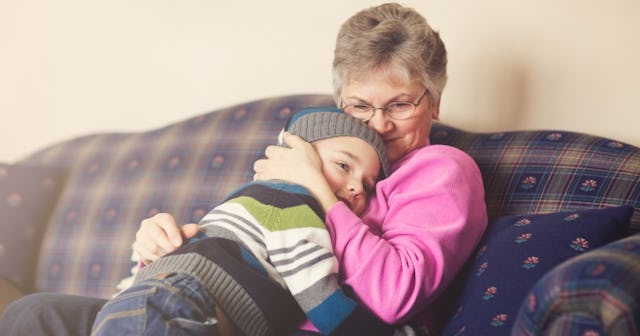Study Proves That Our Moms Might Be More Connected To Our Kids Than Us

If you ever thought that your mother was much nicer or more empathetic towards your kids than she ever was towards you, it might not just be all in your head
A new brain study suggests that grandmas might be more emotionally connected to their grandkids than their own biological children. There have been multiple studies and theories since the 1960s that have suggested that children’s wellbeing and academic performance can be boosted when they have grandparents actively involved in their lives, and Professor James Rilling from Emory University in Atlanta, GA, wanted to see if there was any additional neuroscience to support the claims of the grandmother hypothesis.
Rilling, who is a professor of anthropology, psychiatry, and behavioral sciences, recruited 50 women with at least one grandchild between the ages of three and 12 and studied their brain activity with an MRI as they were shown photographs of their grandchildren, their children, and strangers. The results? Well, maybe you weren’t all that crazy if you think your mom is more excited to see your kids than you.
“When grandmothers viewed photographs of their grandchildren, they particularly activated brain regions that have previously been associated with emotional empathy, suggesting that grandmothers may be predisposed to share the emotional states of their grandchildren,” Rilling told USA Today. The study’s findings insinuate that grannies tend to be more empathetic with grandkids.
“What really jumps out is the activation in areas of the brain associated with emotional empathy,” Rilling told The Guardian. “That suggests that grandmothers are geared toward feeling what their grandchildren are feeling when they interact with them. If their grandchild is smiling, they’re feeling the child’s joy. And if their grandchild is crying, they’re feeling the child’s pain and distress.”
When it comes to adult children, the grandmothers’ brains lit up in a different area, suggesting more of a mental understanding of their adult child
This isn’t to say that our moms forget we exist as soon as grandchildren enter the picture, of course — more than anything, our moms are trying to understand us and cognitively reframe us as, you know, independent adults, which requires different brain functions.
“Emotional empathy is when you’re able to feel what someone else is feeling, but cognitive empathy is when you understand at a cognitive level what someone else is feeling and why,” Rilling said. This makes sense. Your mom might not understand why your toddler felt compelled to color on the walls in permanent marker, but she can understand why you would be frustrated with your kid for their latest unsolicited art work.
“It is our first glimpse at grandmaternal brain function. It suggests that grandmothers particularly rely on neural systems that are involved with emotional empathy when engaging with their grandchildren,” Rilling said. Okay mom, we’ll let your perceived favoritism slide… for now.